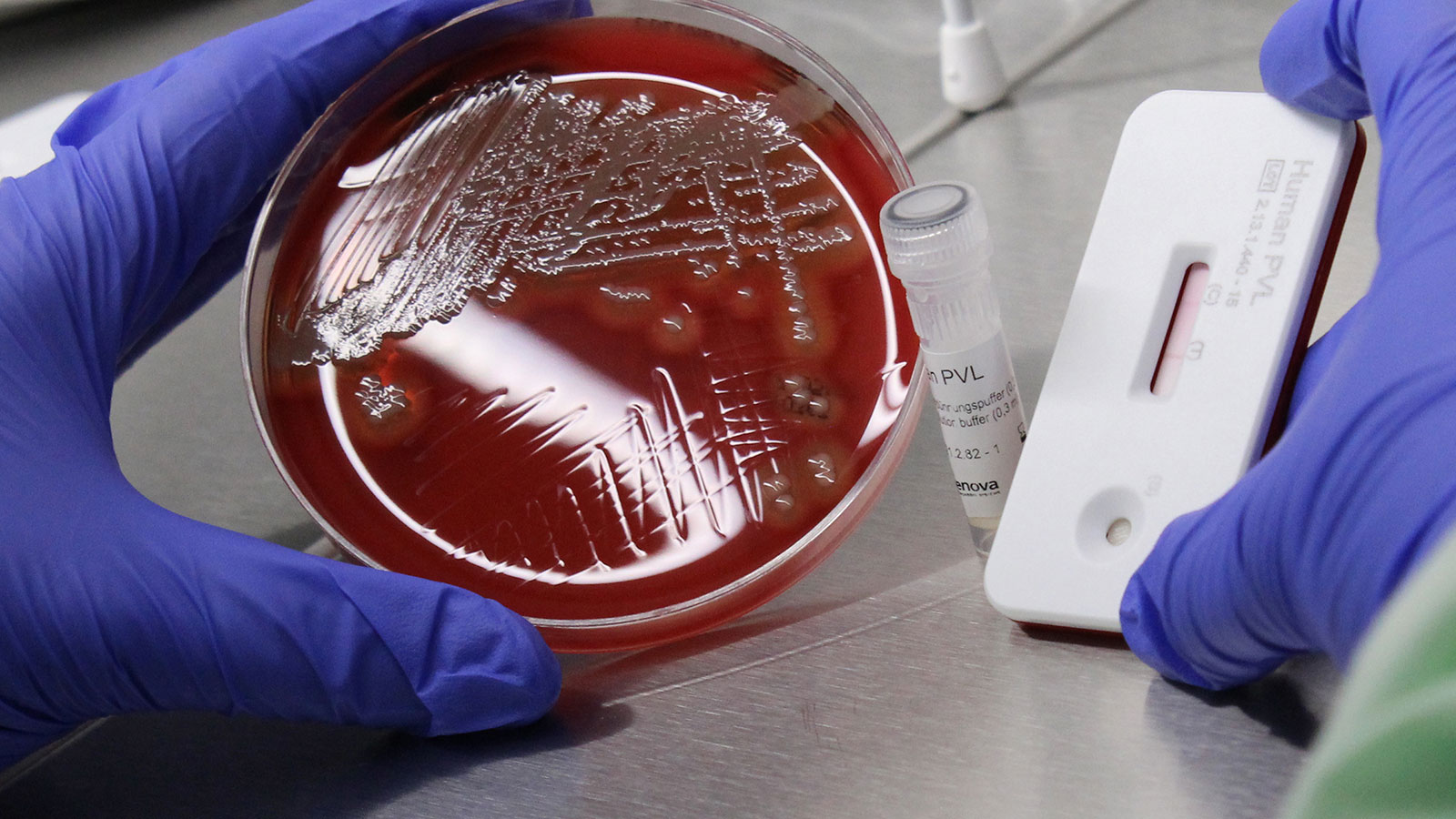Researchers uncover the spread of Staphylococcus aureus strains in the Caribbean

The facultatively pathogenic and often (multi-) resistant bacterium Staphylococcus aureus causes the majority of hospital infections worldwide. On islands in the Caribbean, InfectoGnostics researchers from the Leibniz Institute of Photonic Technology (Leibniz IPHT) were able to extensively characterize strains of the bacterium at the molecular level. The results of their study have now been published in the journal Antibiotics and presented at the 2023 Congress of Infectious Diseases and Tropical Medicine (KIT) in Leipzig.
The aim of the study was the molecular characterization of Staphylococcus aureus (S. aureus) from the Caribbean islands of Trinidad, Tobago and Jamaica in order to gain an understanding of the distribution and epidemiology of this genetically diverse bacterial species. More than 100 isolates were isolated from patients with skin and soft tissue infections.
Using various DNA sequencing techniques and a microarray-based assay developed by INTER-ARRAY by fzmb GmbH (INTER-ARRAY Genotyping Kit S. aureus), the researchers identified and characterized typical S. aureus and closely related S. argenteus strains. The focus was on the investigation of antibiotic resistance, virulence factors, and the ability to produce certain toxins. This made it possible to classify the isolates into different S. aureus groups, the so-called clonal complexes.
The genetic information for the production of Panton-Valentine-Leukozidin (PVL) was detected in almost 40 percent of the isolates examined. PVL is a toxin which, among other things, causes damage to the white blood cells at the site of infection and thus weakens the immune system. The ability to produce PVL is not very widespread in S. aureus and can be seen as a warning signal for significantly increased pathogenicity. The actual production of the toxin was detected in 37 of 38 isolates using a novel rapid test (Senova, Weimar, Germany).
The PVL-producing S. aureus characterized in the research project showed, with one exception, a sensitivity to the antibiotic methicillin. Although this makes it easier to treat a patient compared to methicillin-resistant S. aureus (MRSA), infections of PVL-producing methicillin-sensitive S. aureus (MSSA) are significantly more risky compared to infections of PVL-negative S. aureus, as they can often cause more severe and recurrent infections.
“In the case of skin and soft tissue infections of travelers returning from the Caribbean, physicians should therefore consider a possible staphylococcal infection,” emphasizes Dr. Stefan Monecke from the Optical Molecular Diagnostics and System Technology Research Department at Leibniz IPHT and first author of the study. In the case of an inpatient admission, the examination for S. aureus using a rapid test is recommended in order to initiate prompt and targeted treatment if necessary and to prevent further spread in the hospital.
The study was carried out as part of the InfectoGnostics research projects “ADA” and “ResiCheck”, in which detection systems for the rapid identification and characterization of S. aureus are being developed. The work is part of the basic technologies for the establishment of the Leibniz Center for Photonics in Infection Research (LPI).
About the InfectoGnostics Research Campus Jena
The InfectoGnostics Research Campus Jena is a public-private partnership breaking new ground in the diagnostics of infections and pathogens, such as viruses, bacteria, and fungi. InfectoGnostics is funded by the Federal Ministry of Education and Research (Bundesministerium für Bildung und Forschung, BMBF) under the funding initiative “Research Campus – Public-Private Partnership for Innovation” with additional support from the state of Thuringia. About half of the required budget is financed by the participating partners. www.infectognostics.de
Scientific publication
The researchers published their results in the journal Antibiotics:
Monecke S, Akpaka PE, Smith MR, Unakal CG, Thoms Rodriguez C-A, Ashraph K, Müller E, Braun SD, Diezel C, Reinicke M, et al. Clonal Complexes Distribution of Staphylococcus aureus Isolates from Clinical Samples from the Caribbean Islands, Antibiotics, 2023, 12(6):1050,
https://doi.org/10.3390/antibiotics12061050


